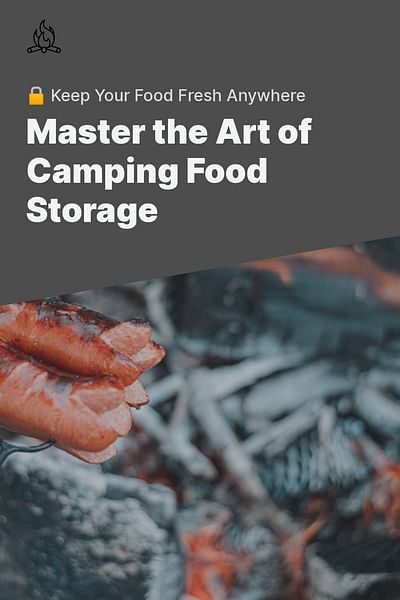Maxwell is a wilderness survival expert and avid camper. He has spent years exploring the great outdoors and has a wealth of knowledge on how to stay healthy and well-fed while camping. Maxwell's recipes are simple, nutritious, and perfect for any camping trip.
When it comes to camping, proper food storage is essential for both safety and convenience. No one wants to deal with spoiled food or attract unwanted visitors like bears and other wildlife. So, what is the best way to store food while camping? Let me break it down for you.
1. Keep it cool: One of the most important things to remember is to keep your food cool. This helps to prevent bacteria growth and keeps your food fresh for longer. If you have access to a cooler, use it to store perishable items like meat, dairy products, and fresh produce. Make sure to pack your cooler with ice or ice packs to maintain a low temperature. Keep the cooler in a shaded area and avoid opening it frequently to retain the cold air.
2. Separate raw and cooked foods: It's crucial to keep raw and cooked foods separate to avoid cross-contamination. Raw meat, poultry, and seafood should be stored in leak-proof containers and placed on the bottom of the cooler to prevent any drips from contaminating other foods. Cooked foods, on the other hand, should be stored in airtight containers and placed on the top shelf of the cooler.
3. Use resealable bags: Resealable bags are a camper's best friend. They are lightweight, space-saving, and great for storing snacks, dried fruits, nuts, and other non-perishable items. They also help to keep your food organized and prevent any spills or leaks.
4. Opt for dehydrated and freeze-dried foods: Dehydrated and freeze-dried foods are excellent options for camping trips. They are lightweight, have a long shelf life, and require minimal storage space. These foods can be rehydrated with water and cooked over a campfire or camp stove, making them convenient and easy to prepare.
5. Utilize dry ice: If you're planning an extended camping trip or don't have access to ice, consider using dry ice. Dry ice can keep your cooler cold for several days without the need for regular ice. However, it's important to handle dry ice with caution and follow the manufacturer's instructions for safe usage.
6. Store food in bear-resistant containers: If you're camping in bear country, it's crucial to store your food in bear-resistant containers. These containers are designed to keep bears and other wildlife out, preventing any potential conflicts. Bear-resistant containers are typically made of sturdy materials like hard plastic or metal and have a secure locking mechanism.
7. Practice Leave No Trace principles: Finally, always remember to practice Leave No Trace principles when it comes to food storage. This means packing out all your trash, including food scraps and packaging. Dispose of them properly in designated trash bins or carry them out with you.
By following these tips, you can ensure that your food stays fresh, safe, and delicious throughout your camping trip. For more tips on food preservation during camping, check out our guide on essential camping food preservation techniques. Happy camping and bon appétit!















